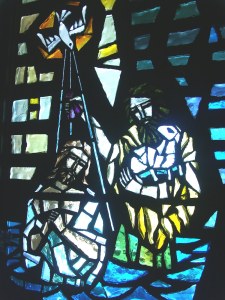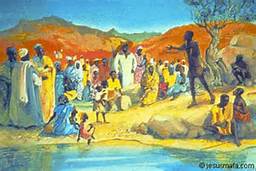“The Baptism, the Love!”

Mark 1:1-11 (1:11) – January 14, 2024
I don’t know about you, but I love taking a bath! My husband is more of a shower person, instead. What do we need when we take a bath? How about a bar of soap, a bottle of shampoo, and maybe a back scrubber? I remember my small children liked a big, fluffy towel, and perhaps even bath toys! That was when they were really small.
I know people need to take regular baths and showers. That’s in order to stay clean and healthy. And, we take baths and showers again and again, because we keep getting dirty and keep needing the cleansing that soap and shampoo provide.
But, what does this have to do with our Scripture reading today? Did you realize that some people – certain faith traditions – refer to baptism as a bath? Do we need soap, shampoo, or bath toys for a baptism? No, not quite the same thing. But, we do need water, and we definitely need the Word of God for this sacrament. [1]
We read these words from the Gospel of Mark: “John the Baptist appeared in the wilderness, preaching a baptism of repentance for the forgiveness of sins. 5 The whole Judean countryside and all the people of Jerusalem went out to him. Confessing their sins, they were baptized by him in the Jordan River.” Not the same thing as taking a bath in a roomy tub, is it?
John the Baptist is specific about a baptism of repentance! And, the Gospel record says that many, many people from Jerusalem and the surrounding countryside flocked to the River Jordan to get baptized.
John the Baptist and Jesus are cousins, and I suspect they grew up together, talked, walked and interacted with one another often. Perhaps studied together, too. Now, John has burst upon the public scene and is proclaimed as a prophet of God! John even has the audacity (and temerity) to call for public confession of sins and a subsequent baptism in the River Jordan! The chief draw was John’s urgent call for the forgiveness of sins. That is the attraction!
Let us shift our focus from the general baptism for the repentance of sins to the specific baptism of Jesus. This special event happens right up front, at the very beginning of the Gospel of Mark. John already has a following, and disciples. John’s getting a great deal of publicity in Palestine. His star is rising, for sure. And what should happen but Jesus shows up at one of John’s baptism events by the river?
Remember, this was before Jesus even started His ministry, before He ever said anything important, or healed anyone, or done anything special at this point. Just think: there is so much pressure on people to be successful in this day and age.
If John the Baptist were our contemporary and had his prophetic ministry today, I can just see him on television, perhaps YouTube. Maybe even short TikTok videos. He was probably too much of a rebel and outsider to be on the inner circle of any denomination or official structure, but I think John would definitely make a splash and be well-known for his straight talking and action-oriented way of communication!
And get this – Jesus asks John to be baptized! Just as Jesus began His ministry with obedience to God, with being baptized, so we are encouraged to begin our lives, our ministries, with baptism, too.
As we consider Jesus being baptized, what happened as He was with His cousin John in the river? Listen to the words of Mark’s Gospel: “Just as Jesus was coming up out of the water, he saw heaven being torn open and the Spirit descending on him like a dove. 11 And a voice came from heaven: ‘You are my Son, whom I love; with you I am well pleased.’”
Remember: this was before Jesus had ever done a miracle, preached a sermon or done anything else that was special. And God said that Jesus was loved and God was well-pleased with Him. “Notice in Mark’s treatment of the story of Jesus’ baptism two things. First, notice God’s words to Jesus. They are personal, poignant, and powerful. “You are my beloved son. With you I am well pleased.” Wrapped in these words of acceptance are the blessings of identity, worth, and unwavering regard.” [2]
What about you and me? When we were baptized, do you think we were loved by God? Yes, God was well-pleased with us, and with every other human of God’s creation! Yes, you and I are also accepted, with the added blessings of identity, worth and unwavering regard, too!
You may remember bracelets and t-shirts with the initials “WWJD” imprinted on them. The words “What Would Jesus Do?” were a Christian, even pop-culture, trend some years ago. Remembering this trend brings up a valid question. Let’s reframe it into a question about baptism. Who would Jesus exclude? For that matter, who would John turn away from baptism?
We celebrate this event in our Lord’s life each year during the season of Epiphany, during January. Yes, praise God, Jesus went into the waters of baptism, and served as an example for us. Plus, this day is a reminder for each of us who have been baptized. Maybe we made our own promises, or perhaps someone made them on our behalf. [3] Regardless, all are welcome to the waters of baptism! This is a sacrament of repentance, forgiveness, and of radical welcome.
St. Luke’s Church, our church, is a member church of the United Churches of Christ. UCC churches are supposed to welcome everyone. No matter if someone is grumpy, or mean, or stingy. You are welcome here at St. Luke’s Church. No matter if someone is painfully shy, or has some physical or mental infirmity, or has a really strong personality. No matter what your gender or sexual orientation is, either. All are welcome here, in this particular church, too.
That means a radical, open-hearted, open-handed welcome to all people, no matter what. No matter who. You and I are welcome with God. We are welcome to the waters of baptism, and with you – and me – God is well-pleased. Amen, alleluia.
(Suggestion: visit me at my other blogs: matterofprayer: A Year of Everyday Prayers. and A Year of Being Kind . Thanks!
[1] https://www.stewardshipoflife.org/2015/01/wet-well-pleased/
[2] https://www.davidlose.net/2015/01/baptism-of-our-lord-b/
[3] https://www.stewardshipoflife.org/2015/01/wet-well-pleased/


